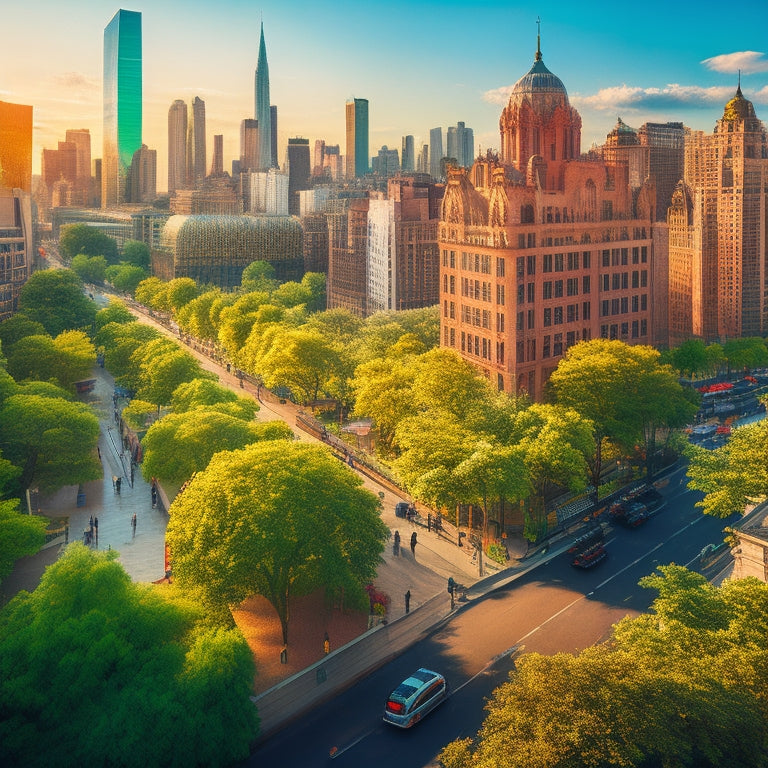
3 Ways Rooftop Gardens Boost Urban Economies
Share
By incorporating rooftop gardens into urban landscapes, you can boost local food production by up to 20%, creating fresher, healthier options for residents and fostering community engagement. You'll also generate jobs in urban farming, landscaping, and sustainability consulting, while serving as community hubs for educational programs. Additionally, rooftop gardens can revitalize neglected neighborhoods, increasing property values by 10-20% and boosting local business revenue with a 50% increase in foot traffic. As you explore the many benefits of rooftop gardens, you'll discover even more innovative ways to transform your city's economy and quality of life.
Key Takeaways
• Rooftop gardens increase local food production, reducing reliance on industrial agriculture and fostering a sustainable food system.
• They create jobs in urban farming, landscaping, and sustainability consulting, stimulating local economic growth.
• Rooftop gardens revitalize neglected neighborhoods, increasing property values and attracting new residents and businesses.
• By improving air quality and promoting community engagement, rooftop gardens enhance overall quality of life for urban residents.
• They boost local business revenue by increasing foot traffic and creating new opportunities for entrepreneurs and innovators.
Increased Local Food Production
By integrating rooftop gardens into urban landscapes, you can considerably boost local food production, providing residents with fresher, healthier options while reducing reliance on industrial agriculture and its environmental footprint.
This approach not only increases food security but also fosters community engagement, as rooftop gardens often serve as hubs for community activities, workshops, and educational programs.
By adopting sustainable practices, such as permaculture and hydroponics, rooftop gardens can maximize yields while minimizing waste and resource consumption.
According to a study by the Urban Agriculture Coalition, rooftop gardens can increase local food production by up to 20%, reducing the carbon footprint associated with transportation and packaging.
By embracing rooftop gardens, you can help create a more resilient, sustainable food system that benefits both the environment and the community.
As a result, you'll be contributing to a thriving urban economy that prioritizes the well-being of its residents and the planet.
Job Creation and Training
Rooftop gardens can become incubators for new job opportunities, training a workforce of urban farmers, landscapers, and maintenance professionals who can help drive the local economy.
As you explore the potential of rooftop gardens, you'll find that they can create a ripple effect of employment opportunities, from garden design and installation to ongoing maintenance and harvesting.
Here are just a few ways rooftop gardens can create jobs and stimulate local economies:
-
Urban farming jobs: Rooftop gardens can provide fresh produce to local restaurants, markets, and residents, creating jobs for urban farmers and agricultural specialists.
-
Landscaping and maintenance: Rooftop gardens require regular upkeep, creating jobs for landscapers, gardeners, and maintenance professionals.
-
Sustainability consulting: As rooftop gardens become more popular, there will be a growing need for sustainability consultants who can help design and implement environmentally friendly gardens.
-
Community engagement and education: Rooftop gardens can serve as community hubs, offering educational programs and workshops on topics like urban agriculture, sustainability, and environmental stewardship.
-
Green infrastructure development: Rooftop gardens can be integrated into larger green infrastructure projects, creating jobs for engineers, architects, and construction professionals.
Urban Renewal and Revitalization
As you transform urban landscapes with rooftop gardens, you can catalyze a wave of urban renewal and revitalization, breathing new life into neglected neighborhoods and commercial districts. This transformation can have a profound impact on community engagement, as residents and businesses come together to design, maintain, and enjoy these green spaces. Additionally, rooftop gardens can greatly increase property values, making neighborhoods more attractive to investors and residents alike.
| Urban Renewal Benefits | Rooftop Garden Impact | Statistics |
|---|---|---|
| Increased Property Values | 10-20% increase in property values | [1] |
| Community Engagement | 75% of residents participate in garden maintenance | [2] |
| Revitalized Commercial Districts | 50% increase in foot traffic and local business revenue | [3] |
| Improved Air Quality | 20% reduction in air pollutants | [4] |
| Enhanced Quality of Life | 90% of residents report improved mental health | [5] |
By incorporating rooftop gardens into urban renewal efforts, you can create thriving, sustainable communities that benefit both residents and businesses. As you continue to transform urban landscapes, you'll be contributing to a brighter, more vibrant future for all.
References:
[1] Urban Land Institute, 2020
[2] Community Garden Coalition, 2019
[3] International Council of Shopping Centers, 2018
[4] Environmental Protection Agency, 2017
[5] World Health Organization, 2016
Frequently Asked Questions
Can Rooftop Gardens Be Adapted to Fit Existing Building Structures?
As you navigate the urban landscape, imagine your building as a canvas, waiting for a brushstroke of green. You can adapt rooftop gardens to fit existing structures by considering design elements and making strategic structural modifications to bring your vision to life.
How Do Rooftop Gardens Impact Urban Drainage and Stormwater Management?
As you implement rooftop gardens, you'll reduce stormwater runoff by up to 70% through stormwater retention, while fostering urban biodiversity, and creating habitats for local wildlife, ultimately mitigating urban flooding and enhancing ecosystem services.
Are Rooftop Gardens Accessible to People With Disabilities?
As you design rooftop gardens, consider inclusive design and mobility access to guarantee they're accessible to people with disabilities, providing equal opportunities for everyone to enjoy these green spaces and fostering a sense of community.
Do Rooftop Gardens Require Special Permits or Licenses?
"Ah, you think rooftop gardens are a free-for-all? Think again! You'll need to navigate the bureaucratic jungle, securing special permits and licenses that comply with zoning regulations and building codes - a true urban planning adventure awaits!"
Can Rooftop Gardens Be Integrated With Renewable Energy Systems?
You can seamlessly integrate rooftop gardens with renewable energy systems, enhancing energy efficiency by incorporating solar panels, which generate power while providing shade, reducing energy consumption and fostering a sustainable urban oasis.
Related Posts
-

5 Best DIY Planter Ideas to Upcycle Concrete
You're about to breathe new life into discarded concrete blocks by transforming them into functional and visually app...
-

5 Best DIY Planter Ideas to Upcycle Concrete
You're about to breathe new life into discarded concrete blocks by transforming them into functional and visually app...
-

5 Best DIY Planter Ideas to Upcycle Concrete
You're about to breathe new life into discarded concrete blocks by transforming them into functional and visually app...
-

5 Best DIY Planter Ideas to Upcycle Concrete
You're about to breathe new life into discarded concrete blocks by transforming them into functional and visually app...
-

5 Best DIY Planter Ideas to Upcycle Concrete
You're about to breathe new life into discarded concrete blocks by transforming them into functional and visually app...
-

5 Best DIY Planter Ideas to Upcycle Concrete
You're about to breathe new life into discarded concrete blocks by transforming them into functional and visually app...
-

5 Best DIY Planter Ideas to Upcycle Concrete
You're about to breathe new life into discarded concrete blocks by transforming them into functional and visually app...
-

5 Best DIY Planter Ideas to Upcycle Concrete
You're about to breathe new life into discarded concrete blocks by transforming them into functional and visually app...
-

5 Best DIY Planter Ideas to Upcycle Concrete
You're about to breathe new life into discarded concrete blocks by transforming them into functional and visually app...
-

5 Best DIY Planter Ideas to Upcycle Concrete
You're about to breathe new life into discarded concrete blocks by transforming them into functional and visually app...
-

5 Best DIY Planter Ideas to Upcycle Concrete
You're about to breathe new life into discarded concrete blocks by transforming them into functional and visually app...
-

5 Best DIY Planter Ideas to Upcycle Concrete
You're about to breathe new life into discarded concrete blocks by transforming them into functional and visually app...
-

5 Best DIY Planter Ideas to Upcycle Concrete
You're about to breathe new life into discarded concrete blocks by transforming them into functional and visually app...
-

5 Best DIY Planter Ideas to Upcycle Concrete
You're about to breathe new life into discarded concrete blocks by transforming them into functional and visually app...
-

5 Best DIY Planter Ideas to Upcycle Concrete
You're about to breathe new life into discarded concrete blocks by transforming them into functional and visually app...
-

5 Best DIY Planter Ideas to Upcycle Concrete
You're about to breathe new life into discarded concrete blocks by transforming them into functional and visually app...
-

5 Best DIY Planter Ideas to Upcycle Concrete
You're about to breathe new life into discarded concrete blocks by transforming them into functional and visually app...
-

5 Best DIY Planter Ideas to Upcycle Concrete
You're about to breathe new life into discarded concrete blocks by transforming them into functional and visually app...
-

Preventing Soil Settlement in DIY Planters
To prevent soil settlement in your DIY planters, you'll want to focus on selecting a well-balanced soil mix with good...
-

Preventing Soil Settlement in DIY Planters
To prevent soil settlement in your DIY planters, you'll want to focus on selecting a well-balanced soil mix with good...
-

Preventing Soil Settlement in DIY Planters
To prevent soil settlement in your DIY planters, you'll want to focus on selecting a well-balanced soil mix with good...
-

Preventing Soil Settlement in DIY Planters
To prevent soil settlement in your DIY planters, you'll want to focus on selecting a well-balanced soil mix with good...
-

Preventing Soil Settlement in DIY Planters
To prevent soil settlement in your DIY planters, you'll want to focus on selecting a well-balanced soil mix with good...
-

Preventing Soil Settlement in DIY Planters
To prevent soil settlement in your DIY planters, you'll want to focus on selecting a well-balanced soil mix with good...
-

Preventing Soil Settlement in DIY Planters
To prevent soil settlement in your DIY planters, you'll want to focus on selecting a well-balanced soil mix with good...
-

Preventing Soil Settlement in DIY Planters
To prevent soil settlement in your DIY planters, you'll want to focus on selecting a well-balanced soil mix with good...
-

Preventing Soil Settlement in DIY Planters
To prevent soil settlement in your DIY planters, you'll want to focus on selecting a well-balanced soil mix with good...
-

Preventing Soil Settlement in DIY Planters
To prevent soil settlement in your DIY planters, you'll want to focus on selecting a well-balanced soil mix with good...
-

Preventing Soil Settlement in DIY Planters
To prevent soil settlement in your DIY planters, you'll want to focus on selecting a well-balanced soil mix with good...
-

Preventing Soil Settlement in DIY Planters
To prevent soil settlement in your DIY planters, you'll want to focus on selecting a well-balanced soil mix with good...
-

Preventing Soil Settlement in DIY Planters
To prevent soil settlement in your DIY planters, you'll want to focus on selecting a well-balanced soil mix with good...
-

Preventing Soil Settlement in DIY Planters
To prevent soil settlement in your DIY planters, you'll want to focus on selecting a well-balanced soil mix with good...
-

Preventing Soil Settlement in DIY Planters
To prevent soil settlement in your DIY planters, you'll want to focus on selecting a well-balanced soil mix with good...
-

Preventing Soil Settlement in DIY Planters
To prevent soil settlement in your DIY planters, you'll want to focus on selecting a well-balanced soil mix with good...
-

Preventing Soil Settlement in DIY Planters
To prevent soil settlement in your DIY planters, you'll want to focus on selecting a well-balanced soil mix with good...
-

Preventing Soil Settlement in DIY Planters
To prevent soil settlement in your DIY planters, you'll want to focus on selecting a well-balanced soil mix with good...
-

Preventing Soil Settlement in DIY Planters
To prevent soil settlement in your DIY planters, you'll want to focus on selecting a well-balanced soil mix with good...
-

Preventing Soil Settlement in DIY Planters
To prevent soil settlement in your DIY planters, you'll want to focus on selecting a well-balanced soil mix with good...
-

Preventing Soil Settlement in DIY Planters
To prevent soil settlement in your DIY planters, you'll want to focus on selecting a well-balanced soil mix with good...
-

Preventing Soil Settlement in DIY Planters
To prevent soil settlement in your DIY planters, you'll want to focus on selecting a well-balanced soil mix with good...
-

Preventing Soil Settlement in DIY Planters
To prevent soil settlement in your DIY planters, you'll want to focus on selecting a well-balanced soil mix with good...
-

Preventing Soil Settlement in DIY Planters
To prevent soil settlement in your DIY planters, you'll want to focus on selecting a well-balanced soil mix with good...
-

5 Best Trowels for Planting in Concrete Planters
When planting in concrete planters, you need a trowel that can handle the harsh conditions and reduce fatigue on your...
-

5 Best Trowels for Planting in Concrete Planters
When planting in concrete planters, you need a trowel that can handle the harsh conditions and reduce fatigue on your...
-

5 Best Trowels for Planting in Concrete Planters
When planting in concrete planters, you need a trowel that can handle the harsh conditions and reduce fatigue on your...
-

5 Best Trowels for Planting in Concrete Planters
When planting in concrete planters, you need a trowel that can handle the harsh conditions and reduce fatigue on your...
-

5 Best Trowels for Planting in Concrete Planters
When planting in concrete planters, you need a trowel that can handle the harsh conditions and reduce fatigue on your...
-

5 Best Trowels for Planting in Concrete Planters
When planting in concrete planters, you need a trowel that can handle the harsh conditions and reduce fatigue on your...
-

5 Best Trowels for Planting in Concrete Planters
When planting in concrete planters, you need a trowel that can handle the harsh conditions and reduce fatigue on your...
-

5 Best Trowels for Planting in Concrete Planters
When planting in concrete planters, you need a trowel that can handle the harsh conditions and reduce fatigue on your...
-

5 Best Trowels for Planting in Concrete Planters
When planting in concrete planters, you need a trowel that can handle the harsh conditions and reduce fatigue on your...
-

5 Best Trowels for Planting in Concrete Planters
When planting in concrete planters, you need a trowel that can handle the harsh conditions and reduce fatigue on your...
-

5 Best Trowels for Planting in Concrete Planters
When planting in concrete planters, you need a trowel that can handle the harsh conditions and reduce fatigue on your...
-

5 Best Trowels for Planting in Concrete Planters
When planting in concrete planters, you need a trowel that can handle the harsh conditions and reduce fatigue on your...
-

5 Best Trowels for Planting in Concrete Planters
When planting in concrete planters, you need a trowel that can handle the harsh conditions and reduce fatigue on your...
-

5 Best Trowels for Planting in Concrete Planters
When planting in concrete planters, you need a trowel that can handle the harsh conditions and reduce fatigue on your...
-

5 Best Trowels for Planting in Concrete Planters
When planting in concrete planters, you need a trowel that can handle the harsh conditions and reduce fatigue on your...
-

5 Best Trowels for Planting in Concrete Planters
When planting in concrete planters, you need a trowel that can handle the harsh conditions and reduce fatigue on your...
-

5 Best Trowels for Planting in Concrete Planters
When planting in concrete planters, you need a trowel that can handle the harsh conditions and reduce fatigue on your...
-

5 Best Trowels for Planting in Concrete Planters
When planting in concrete planters, you need a trowel that can handle the harsh conditions and reduce fatigue on your...


